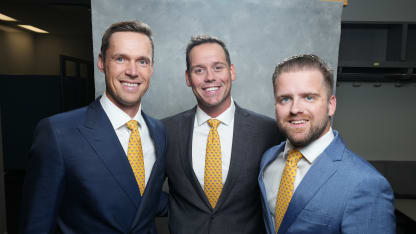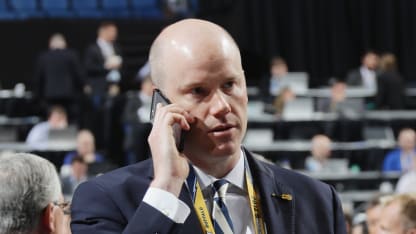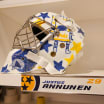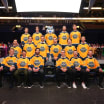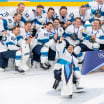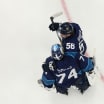They are quickly becoming one of hockey’s worst-kept secrets.
The Nashville Predators Hockey Operations staff affectionately refers to them as the “Department of Goaltending Excellence.”
To their players and fellow coaches, they are simply Benny, Jay and Peks.
No matter what you call them, they are the Predators goalie coaches, the masterminds who have helped to turn Nashville into an elite goaltending powerhouse.
This is the story of the special relationship between these three men, and how it has produced some of the best goalies – and people – in the world.
The Leader
Ben Vanderklok is in his ninth season as the Head Goaltending Coach of the Nashville Predators. He coached franchise goaltender Pekka Rinne, the 2018 Vezina Trophy winner and four-time NHL All-Star; and he now coaches Juuse Saros, franchise record holder of a 46-save shutout, two-time NHL All-Star and member of the 2018 NHL All-Rookie Team.
Previously, Vanderklok spent five years as the Predators Assistant Goaltending Coach, a role in which his main responsibility was developing the organization’s goalie prospects on the Milwaukee Admirals (AHL) and its ECHL affiliate. Vanderklok also spent six seasons as the Goaltending Coach of the Niagara Ice Dogs (OHL) and as the Goaltending Coach for the Brock Badgers CIS University Hockey team.
Throughout his coaching career, Vanderklok has worked to develop goaltenders who have gone on to play successful major junior and professional hockey careers. He excels at teaching the modern fundamentals of goaltending and is well known for his ability to take goaltenders to the next level.
Vanderklok has a proven method for developing goaltenders to reach their maximum potential – and it’s rooted in the relationships he’s made along the way.
The Student
Following the conclusion of the 2022-23 season, Vanderklok was faced with the unenviable task of replacing longtime Goaltending Development Coach Dave Rook.
Rook, who had recently joined the Anaheim Ducks staff as an Assistant Goalie Coach, had spent the previous five seasons with the Predators as Goaltending Development Coach (2018-23) where he worked with goaltenders throughout the organization with a focus on Nashville’s prospects in the American Hockey League (AHL) and ECHL.
“I think we had a really good working relationship,” Vanderklok said. “In our industry, the one thing that is unfortunate is that we often go different ways. We had a long time together, and now he's in a position where he was able to take a step up. So when we needed to refill that position, it was important to me to get somebody that had similar philosophies… and also somebody that's young, that is ambitious and innovative and can stay current and bring new, fresh ideas and things that are outside of the box.”
Enter: Jason Barron.
Barron began as a student of Vanderklok before transitioning into an instructor role at Vanderklok’s goaltending camps in St. Catharines, Ont. He spent two seasons as the Goalie Coach of the OHL’s Niagara IceDogs, working with the goaltenders within their organization as well as facilitating goalie scouting and player development.
Prior to his role with the IceDogs, Barron spent four seasons with the OHL’s Erie Otters as the Assistant Director of Player Development, overseeing the drafting and player development process of the organization’s goaltenders. He also joined Hockey Canada in October 2022, coaching at the IIHF U-17 World Championship as the Goalie Coach of Team Canada Black.
When Vanderklok approached Barron with an opportunity to join his staff in Nashville and Milwaukee, Barron didn’t have to think twice about it.
“It was a no brainer,” Barron said. “Having known Ben personally and professionally for such a long time… we speak the same language when it comes to goaltending and prioritize a lot of the same things. So when the opportunity presented itself – first and foremost, I’m grateful for it, and second of all, to be able to do it with someone that I have spent so much time with and mentored under and collaborated with has really been unbelievable.”
Now working alongside his longtime coach and mentor, Barron is still learning from Vanderklok every day as he works to develop the Predators goaltending prospects.
“As a coach, you're constantly learning,” Barron said. “Being able to do it with someone that you know, I've learned alongside for so many years. It's been a really invaluable experience. Everybody's been phenomenal.”
The Legend
Of course, one can’t talk about Nashville Predators goalies without mentioning the franchise netminder whose name has become synonymous with the organization’s goaltending excellence.
Rinne, who played his entire 683-game NHL career in Nashville, retired in 2021 after 15 seasons. In 2022, his No. 35 jersey became the first and only retired jersey in the history of the Predators organization. Rinne retired as the Predators franchise leader in nearly every goaltending category, including games played (683), wins (369), goals-against average (2.43), total time on ice (39,413:29), shutouts (60) and saves (17,627); in NHL history, he sits 19th in shutouts and is tied for 20th in victories.
“I never took for granted how lucky I was to have him as a player and a person to work with,” Vanderklok said. “It's a coach's dream to have that type of person and player. I knew how lucky I was… and then when Juuse came in, it was even more unique and more special because of their relationship together.”
Indeed, Vanderklok appreciated Rinne the goalie as a student of the game and a coach’s dream; but he didn’t fully appreciate until after his retirement the impact that Rinne the person had made on his life for more than a decade.
“The one thing I didn't do was really think about how [Rinne’s retirement] would have impacted me personally,” Vanderklok said. “It was hard that first year when he was gone. That's all I knew from being in Nashville, was seeing him in the morning and talking to him. We would spend a lot of time together, so there was a void there for me – it was like, ‘Oh, Pekka’s gone.’ But I never thought for one second how it would impact me personally.”
While Rinne the goalie may no longer have been occupying the Predators crease, Vanderklok began to search for ways to keep Rinne the person involved in his day-to-day life.
“I started thinking, ‘I wonder if he's missing me or feeling that void as a former player,’” Vanderklok said. “So I just randomly reached out and said, ‘Are you watching the game?’ and I started sending him the clips of the games. Sure enough, in typical fashion, he would watch them and get back to me and give me feedback and thoughts. Eventually, he was watching every single game without me even asking; he was watching the clips and sending me comments on what he thought.”
Over time, Rinne had become a de facto Assistant Goalie Coach to Vanderklok – and his feedback was all the more meaningful, given that he had stood in the same crease for so many years.
“He was really helpful with personal questions that only former players could answer because they had played the position,” Vanderklok said. “Like, ‘How would you recommend I handle this with Juuse?’ or whatnot. And it was always really good feedback. I'm just really happy that it grew into what it's grown into. That wasn't by design; I think it just happened organically.”
Like Vanderklok, Rinne had been feeling a void. Resuming their daily conversations felt only natural.
“Everything started from the relationship we had as a player and a coach, and then it turned pretty quickly into a friendship, too,” Rinne said. “That’s behind it all. Personally, this organization is obviously really important to me. I spent my whole career here.”
On June 26, then-incoming General Manager Barry Trotz announced that the team had named Rinne as European Development Coach and Scout. In the role, Rinne works primarily with all goaltenders in the organization, including prospects overseas; scouts European-based goalies for the franchise; and continues to work, learn and observe alongside Vanderklok.
“Certainly, I'm really happy he's in the organization, as everybody is,” Vanderklok said. “But I’m really happy it's on the goalie side. I think that the unique part about it, too, is that he speaks the same language in terms of teaching. There's a lot of transparency with his thoughts, his philosophies, his beliefs – and I think that probably came from our relationship. Coaching was never a one-way street. It was never ‘You need to do this because I said so;’ it was always through dialogue and conversation.”

